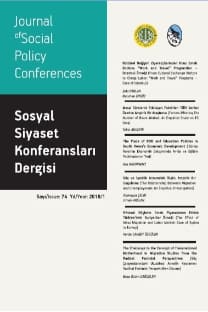The Impact of Technological Progress of Turkish Banking Industry on the Sector’s Employment
The Turkish economy
witnessed a significant structural change in all of its industries since the
terrifying economic meltdown occurred in 2001. The main objective of that
inevitable structural change was to restructure the scattered economy, and
accelerate its process of international integration. Thanks to the banking
reform conducted within this framework, Turkish banking sector has willingly participated
to this change process too. In this study, it is examined how the sector’s
employment has been affected by the acceleration of foreign direct capital
inflows to the sector as a result of the judicial and technological
restructuring in Turkish banking industry within this scope. However, thanks to
the Turkish banking sector’s unique ability to tap into information
technologies to the full extent, it was observed that the employment loss in
the Turkish banking industry experienced after the economic meltdown in 2001
was first recovered, and then more jobs were created than that of 2001 levels
during the following stage. In line with this change, there is also seen an
increasing rate of human capital accumulation in the volume of labor-force in
this sector.
Anahtar Kelimeler:
Turkish Banking Industry, Foreign Capital, Technological Progress, Employment
___
- REFERENCES
- Akgeyik, T.-Yavuz, A.; ‘Foreign Capital Inflow in Turkish Banking Industry: Risk? Opportunity?’, School of Economics Journal, Vol. 59, Issue 2, Year-2009, p.25-60
- Ayan, E.; ‘Employment Analysis and Employment Enhancement Possibilities in Turkish Banking Industry’, Business and Economics Research Journal, Volume 3 Number 1 2012, s. 41-57
- Bülbül, O.G.-Emirmahmutoğlu, F.; ‘The Impact of Foreign Direct Investments: The Case of Turkish Banking Industry’, Gazi University İ.İ.B.F. Journal, 12/1, (2010), p.205-238
- Gençler, A.; ‘The Impact of Economic Crisis of 2001 on Employment of Turkish Banking Industry’, İ.Ü. School of Economics Social Policy Conferences, Issue: 50, Year: 2005
- İçli, G.; ‘Education, Employment, and Technology’, Pamukkale University Faculty of Education Journal, Year:2001, Issue:9, p.65-71
- Kesici, M. R.; ‘Employment and Unemployment in High Growth Stage of Turkish Economy’, Jobs-Industry Relations and Human Resources Journal, July - 2010, Vol.:12, Issue: 03, p. 07-26
- Kılıçbay, A.; Turkish Economy, Turkey İş Bank’s Cultural Publications, Issue: 263, 5.Press, İstanbul-1994
- Murat, S.; Istanbul’s Structure of Employment and Man-Power from Past to Today, Istanbul Chamber of Commerce, Issue: 2007-73, İstanbul-2007
- Öncü, S, - Aktaş, R.; ‘Efficiency Change in The Turkish Banking Industry in The Period of Restructuring’, Management and Economy, Year: 2007, Vol.:14, Issue:1, Celal Bayar University, İ.İ.B.F., Manisa, p. 247-266
- Sansalcılar, A.R.; ‘The Impact of Foreign Direct Investments on Employment in Turkey: Time-Series Analysis’, Atatürk University Economics and Social Sciences Journal, Vol.: 26, Issue: 3-4, 2012, p.273-285
- Şenkal, A.;‘The Impacts of Technological Developments on Collective Bargaining’, Social Policy Conferences, 43-44 Book, 2000, p.261-280
- Turkish Central Bank; Financial Education and Access to Financial Services in Turkey and World, March-2011, Online: www.tcmb.gov.tr/yeni/evds/yayin/kitaplar/finansal_egitim.pdf The Banks Association of Turkey; Online: www.tbb.org.tr/tr/banka-ve-sektor-bilgileri/istatistiki-raporlar/eylul--2002---banka,-sube-ve-personel-bilgileri-/275
- Yılmaz, S.; Investment, Growth, and Inflation in Macroeconomic Theory, Beşir Bookstore, İstanbul-2004
- ISSN: 1304-0103
- Yayın Aralığı: Yılda 2 Sayı
- Başlangıç: 1948
- Yayıncı: İstanbul Üniversitesi Yayınevi
Sayıdaki Diğer Makaleler
Gecekondu Bölgelerindeki Yoksulluk ile Mücadelede Mikrofinansın Rolü: İzmir Örneği
Kamu Çalışanlarının Stratejik Planlama Süreç ve Sonuçlarına İlişkin Görüşleri: Bir Olay Çalışması
Bireyci Ekol’den Postmodern Performans Değerlendirmeye: Epistemolojik Bir Tartışma
The Impact of Technological Progress of Turkish Banking Industry on the Sector’s Employment
61. Sosyal Siyaset Konferansları
Sosyal Siyaset Konferansları DERGİSİ
The Geographical Mobility of Academic Staff in Turkey: The Law Schools Example
